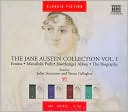

 |

|

The average rating for Jane Austen Collection: Emma/Mansfield Park/Northanger Abbey/The Biography based on 2 reviews is 4 stars.
Review # 1 was written on 2016-02-05 00:00:00 John Dooley John DooleyEmma Perhaps arguably the second most popular of the writer's works vying with Mansfield Park for the title, this one again explores values and conflicts from another angle, with growth of character and perception, and temptation to meddle in social affairs, as the chief theme. It is more serious than it looks, as is usual with a good deal of her work, where the seemingly most superficial and romantic turns out to be most serious and worthy of note. More people than would care to acknowledge or admit even to themselves do meddle in affairs of others, especially those of heart, with a fond illusion that they can do good to others and provide their happiness for them. But lacking in perception and maturity and judgement and discrimination they often spoil more than they would like to admit, often ruining lives. Couples that might change the world with their love are torn asunder by a disapproving bunch of relatives or even religious heads with their "concern" for the "soul" of the one who might bring wonderious gifts but is not one of them (hence the gifts of course), and the miracle that would have been the families and souls generated with such love are nipped in the bud. Of course, it is only the couple that knows the tremendous love and the pain and suffering of being torn asunder, while others merely go about congratulating one another for having averted an unsuitable match with an outsider. Of course, meddling is not limited to that - couples that could have changed the course of the universe with their love and their gifts combined often get torn apart by meddling others who delude themselves that they were acting in good faith for the betterment of society, and if it is clear they were tormenting a woman or a daughter, well that is what they are for - so they can learn to do the same to others in turn, if so lucky, and so goes the chain. Jackals manage to devour the marriage and the love and even the children on all but physical level. Meanwhile gifts of heaven go squandered into dust because the couples are either too weak to hold on to each other and to their heavenly gift of creation of a new world, or even worse, because one gets turned against another and hurts until the one hurt is no more, which is when the survivor might realise if lucky of what has been lost, even though it might be too late. Often such realisation awaits death of the one who hurt the other one into death. None of this happened in Emma - she was lucky, to have good counsel and love guarding her, and her weakness of character of meddling with others nipped in bud and her mistakes of perception corrected by someone wiser and stern about serious faults. She was lucky indeed. ....................................... Mansfield Park:- The writer of the universally popular Pride And Prejudice explores another angle of the conflicts of dealing with life as it is dealt out - wealth and relative status, temptation and opportunities, family and relationships, extended family and relatives, and love that never might be attained. Above all are rectitude and character and values, to be never lost whatever the temptation. ....................................... Northanger Abbey The not so well to do young woman is taken to a resort by comparatively well to do relatives and is invited by the master of the Northanger Abbey, the father of the young and eligible gentleman who has a mutual attracted to her and courting her, to stay with him and his family, under the impression the she is going to inherit the relatives' money. The character of this father, the rich owner of the home that is the title, unfolds, and there are confusion, test of virtue and character, and separations and misunderstandings. The young man however has excellent character and fortunately realises what is what, and love triumphs even without money. ....................................... |
Review # 2 was written on 2014-05-17 00:00:00 Annabelle Claghorn Annabelle ClaghornJohn Lahr has the first and last word on Joe Orton, and it doesn't feel right. I've read his foreword to Orton's diary, his foreword to Orton's collected works and this, his Orton biography. I'm thinking: 1) Lahr's narrative is so powerful that when Lahr interviews people for a BBC documentary (youtube), they tell the same anecdotes back at him as he set them down in the biography. I'm suspicious. Doesn't anyone have a different take? Lahr seems to avoid a "this is my assessment of Joe Orton" approach and goes for "This Is Joe Orton. Nailed." And there are elements that must be controversial: we do not know that Joe planned to leave Kenneth. 2) I think that Lahr finds it really hard to forget that Kenneth kills Joe at the end. He has something of the approach of a Whig historian; everything in Joe's life signposts to the murder at the end. Really? Is this how our lives work? 3) This is a literary biography; Lahr is looking for Orton in his plays. But Orton isn't Shakespeare; he wrote three full length plays and, crucially, many of the people Orton met are still alive. It would be possible to talk to them. I felt that I wanted more of this. What was Orton like in prison? Surely there are records of the prisoners and prison officers he would have known. Did they have anything interesting to say? |
CAN'T FIND WHAT YOU'RE LOOKING FOR? CLICK HERE!!!